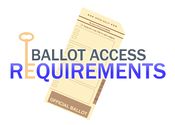Illinois State Board of Elections v. Socialist Workers Party
| Illinois State Board of Elections v. Socialist Workers Party | |
| Court: | U.S. Supreme Court |
| Text: | Text of decision |
| Holding: | |
| A statutory requirement in Illinois that new political parties and independent candidates for elections in political subdivisions (specifically, Chicago) gather more than the number of signatures required for elections for statewide office was found to be unconstitutional. | |
| Case history | |
| Filed: | January 24, 1977 |
| Trial court: | U.S. District Court |
| Appellate court: | U.S. Court of Appeals |
| Appellate court: | U.S. Supreme Court |
| Author, appellate decision: | Thurgood Marshall |
| Appellate court decision: | February 22, 1979 |
Illinois State Board of Elections v. Socialist Workers Party, a case decided by the U.S. Supreme Court in 1979, rendered unconstitutional a statutory requirement that new political parties and independent candidates for elections in political subdivisions (specifically, Chicago) gather more than the number of signatures required for elections for statewide office.[1]
Background
New political parties and independent candidates were required to gather the signatures of 25,000 qualified voters in order to appear on the ballot for statewide elections. In political subdivisions of the state (cities, counties, etc.), the minimum number of required signatures was 5 percent of the number of persons who voted at the previous election for such office. By these provisions, new parties and independent candidates were required to gather more than 25,000 signatures required for statewide office in a special Chicago mayoral election in 1977.
The Socialist Workers Party, among other interested groups and individuals, filed actions challenging these signature requirements, arguing that the discrepancy constituted a violation of First and Fourteenth Amendment rights. The U.S. District Court enjoined enforcement of the 5 percent provision in the event that it mandated more than 25,000 signatures, and the U.S. Court of Appeals affirmed that ruling.
Decision
In a unanimous decision, the U.S. Supreme Court held that the disputed statute violated the Equal Protection Clause of the Fourteenth Amendment, ruling that the state did not successfully establish that the requirements were necessary to serve a legitimate interest. Justice Thurgood Marshall wrote the following in the Court's opinion:
| “ |
The States' interest in screening out frivolous candidates must be considered in light of the significant role that third parties have played in the political development of the Nation. Abolitionists, Progressives, and Populists have undeniably had influence, if not always electoral success. As the records of such parties demonstrate, an election campaign is a means of disseminating ideas, as well as attaining political office. Overbroad restrictions on ballot access jeopardize this form of political expression.[1][2] |
” |
See also
- Ballot access for major and minor party candidates
- Other ballot access lawsuits:
- Williams v. Rhodes (1968)
- Bullock v. Carter (1972)
- Lubin v. Panish (1974)
- Storer v. Brown (1974)
- Anderson v. Celebrezze (1983)
- Norman v. Reed (1992)
- U.S. Term Limits, Inc. v. Thornton (1995)
External links
Footnotes
- ↑ 1.0 1.1 Justia.com, "Illinois State Bd. of Elections v. Socialist Workers Party - 440 U.S. 173 (1979)," accessed December 26, 2013
- ↑ Note: This text is quoted verbatim from the original source. Any inconsistencies are attributable to the original source.
| ||||||||||||||||




